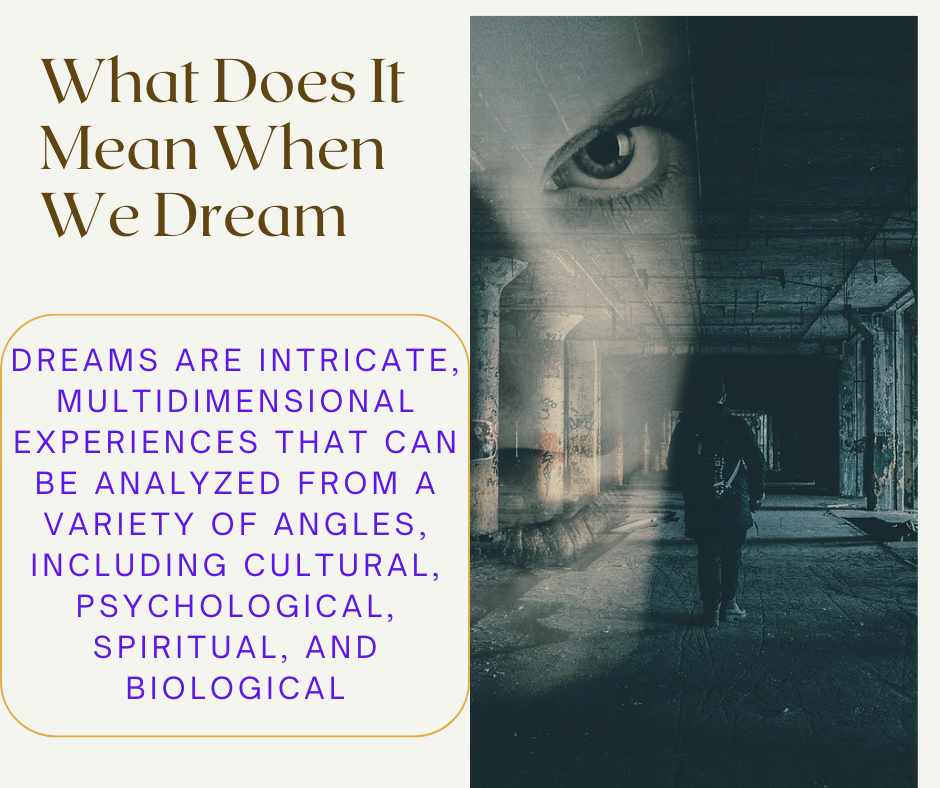Since ancient times, people have been fascinated by dreams, which are crucial to our comprehension of our inner selves, psyche, and the bigger mysteries of life. While the scientific community explains the reasons for our dreams, including neuronal activity, emotional processing, and memory consolidation, the spiritual realm presents an alternative viewpoint.
As per several spiritual and mystical traditions, dreams serve as a channel for communicating with the divine or spiritual guides, connecting with a higher world, and manifesting our aspirations, in addition to reflecting our subconscious. This article will discuss the origins of dreams from a spiritual and scientific standpoint, as well as the idea of manifesting in the spiritual realm.
Table of Contents

The Science of Why We Dream
It’s crucial to comprehend the scientific rationale for dreams before delving into their spiritual importance. The REM (Rapid Eye Movement) stage of sleep, when the brain is most active, is when dreams mostly happen. This stage is comparable to when we are awake. Although there are numerous hypotheses regarding the precise purposes of dreams, psychological and neuroscientific research has produced a number of important concepts.
1. Emotional Regulation and Memory Consolidation
One commonly held belief is that dreams aid in memory consolidation and emotional processing. The knowledge that has been accumulated throughout the day is organized by our brain as we sleep. Dreams can assist us in understanding trauma, unresolved events, and complicated emotions. Because dreams are symbolic, the brain is able to integrate and process emotions without overpowering us while we are awake.
People frequently dream about stressful situations or unsolved disputes, for example. These dreams offer a secure space for the mind to process those feelings, even though they might not always accurately reflect the circumstances. This dream-based emotional control aids in lowering perplexity, stress, and anxiety.
2. Cognitive Processing and Problem Solving
Dreams are also thought to be a cognitive tool for problem-solving. Some people solve difficulties in the real world or generate innovative ideas after sleeping on them, according to research. Without the constraints of reality or logic, the brain may investigate various situations or possible fixes for issues during a dream. Other names for this phenomena include “sleep learning” and “incubation effect.” Many authors, artists, and inventors, for instance, attribute their creative breakthroughs to their dreams.
Renowned painters like Salvador Dalí drew inspiration from their vivid dreams, while renowned chemist Dmitri Mendeleev is said to have dreamed about the periodic table. Salvador Dalí and other well-known artists drew inspiration from their vivid dreams, while renowned chemist Dmitri Mendeleev is said to have dreamed about the periodic table.
3. Restorative Function
More fundamentally, dreaming is a component of sleep’s general restorative process. In general, both physical and mental health depend on getting enough sleep. It helps the brain eliminate metabolic waste and allows the body to heal itself. Dreams are thought to play a crucial role in this healing process by providing mental and physical equilibrium.
Even if these scientific explanations offer a strong grasp of the physiological causes of dreaming, they may not be sufficient to explain why some dreams seem to be connected to higher forces that are beyond our understanding or why some dreams feel intensely spiritual, vivid, or prophetic.
Dreaming in the Spiritual Realm
Dreams have traditionally been seen as a conduit to worlds beyond our physical existence from a spiritual standpoint. Dreams have been interpreted as prophetic visions, spiritual experiences, or sacred messages by people of many cultures, faiths, and belief systems. In the spiritual realm, dreams can serve as a conduit for connecting with spiritual mentors, receiving divine messages, or manifesting wishes.
1. Dreams as a Gateway to Spiritual Realms
Dreams, according to many spiritual traditions, serve as a conduit between the spiritual and material worlds. These perspectives hold that dreams provide a direct link to a spiritual realm or higher state of awareness where we can get direction from angels, deities, or ancestors. In this way, dreams are acts of spiritual communication rather than only mirroring our subconscious.
For instance, dreams are regarded as visions or holy messages from the spirit world in Indigenous civilizations, especially Native American customs. A ubiquitous emblem in various societies, dreamcatchers are believed to collect harmful or negative dreams while letting through sacred and positive visions.
These dreams may involve visits from spirit animals, departed family members, or other beings who offer counsel, wisdom, or caution. Dreams were regarded as omens or prophetic revelations in other cultures, such as ancient Egypt or Mesopotamia, where the dreamer received divine guidance or warnings about impending events from gods or other divine entities.
2. Manifesting Desires in Dreams
According to the spiritual idea of manifestation, we can employ concentrated thought, intention, and energy to make our desires come true. Many traditions consider dreams to be a place where this process of manifestation takes place. In order to attract or create the world we desire, the subconscious mind is thought to be able to sync with universal forces during dreams.
For example, the Law of Attraction, a well-known idea in New Thought spirituality, holds that one can draw good things into their life by concentrating on positive feelings and ideas. Since dreams can act as a “blueprint” for reality and represent the inner workings of the subconscious, they are seen as a potent instrument for manifestation. In this way, dreaming transforms from a passive pastime into an active process of consciously and unconsciously bringing one’s goals to life.
Dreams can also serve as a kind of mental rehearsal in which the dreamer imagines their objectives and desires. These manifesting dreams can work as a kind of vision board for the soul, assisting the dreamer in identifying their goals, coordinating their energies, and acting on their inspiration when they awaken.
3. Receiving Divine Messages and Guidance
Dreams are seen in many religious traditions as a potent means of communication between people and the divine or higher powers. For example, God regularly uses dreams in the Bible to communicate with important characters like Joseph and Daniel, disclose prophesies, or give them instructions. In the Old Testament, Joseph is a famous person whose dreams foretold his future, which included becoming the ruler of Egypt.
Similarly, according to Islamic tradition, the Prophet Muhammad had dreams in which he received revelations and instruction. Muslims hold that some dreams, particularly those that have prophetic or divine meaning, are a kind of spiritual advice from Allah (God). Usually, these dreams are deciphered by scholars, imams, or spiritual leaders with extensive knowledge of the Quran’s teachings.
Dreams are seen as chances to receive messages from ancestors, spirit guides, or guardian angels in other spiritual traditions. For instance, people may have dreams in which they meet departed loved ones who provide guidance, comfort, or emotional closure. These experiences can offer consolation, guidance, and spiritual support.
4. Lucid Dreaming and Spiritual Exploration
The technique of becoming conscious of and in control of one’s dreams, known as lucid dreaming, is frequently regarded as a means of fostering spiritual development. The dreamer may travel to other worlds, partake in spiritual activities, or even speak with spiritual entities during lucid dreams. Some people utilize lucid dreaming to have deep spiritual experiences, heal old wounds, or pursue enlightenment.
For example, lucid dreaming is regarded as a highly developed spiritual technique in Tibetan Buddhism that enables people to transcend the ego and establish a connection with the universe’s pure consciousness. In order to improve their spiritual consciousness and comprehend the essence of reality, Tibetan monks frequently employ dream yoga techniques. Practitioners can develop mindfulness, detachment, and a profound understanding of life’s impermanence by being conscious while dreaming.
5. Shamanic and Visionary Dreams
According to shamanic, dreams are potent experiences that allow the soul to journey to different levels or realms in search of insight, healing, or direction. In order to reach altered states of consciousness and speak with spirits, ancestors, or otherworldly beings, shamans frequently participate in rituals or ceremonies.
In addition to offering profound spiritual lessons, these visionary dreams are believed to address individual or group issues. Dreams can be used to manifest healing in certain shamanic traditions. To interact with spiritual beings that aid in the healing process of a person or a community, for example, the shaman may enter a dream state. Thus, dreams serve as a gateway to spiritual development, personal growth, and transformation.
The Role of Intention in Spiritual Manifestation through Dreams
In the spiritual realm, the idea of manifesting implies that our goals, feelings, and thoughts have the capacity to influence our reality. In this sense, dreams are an extension of our spiritual will, expressing wisdom, healing, or desires. Aligning one’s goal with the energy of the universe—whether by meditation, prayer, or concentrated thought while sleeping—is the secret to this manifestation.
According to many spiritual traditions, when we dream, we are sowing seeds for the future as well as reflecting our present reality. By enabling the dreamer to see their feelings and desires as they materialize in the dream world, these dreams turn into a spiritual tool for manifestation. It is thought that we can bring our aspirations into the real world by clinging to love, intention, and positive energy in our dreams.
Conclusion
Dreams are an intriguing and complex phenomenon that lies at the nexus of spirituality, psychology, and individual experience. According to science, dreams are essential for controlling emotions, forming memories, and solving problems. But from a spiritual standpoint, dreams can be much more than that; they are viewed as a means of achieving goals, getting direction from God, or establishing a connection with the spiritual world.
One thing is certain: dreams have great power, regardless of whether you see them as a window into a more profound spiritual life or as a mirror of your subconscious. We can discover new methods to interact with our inner selves, bring our desires to life, and delve into the mysteries of the spiritual realm by comprehending the psychological and spiritual aspects of dreams.
